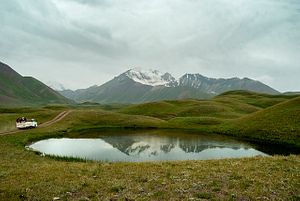It didn’t take long for the news that a Czech company had signed on to take over abdicated Russian financing of several hydropower projects in Kyrgyzstan to become a political scandal.
Last week, Kyrgyz President Almazbek Atambayev’s office announced that Bishkek and the Czech renewable energy company Liglass Trading had reached an agreement on the construction and operation of the Akbulun hydropower project (HPP) and Naryn HPP-1, part of the Upper Naryn cascade, as well as series of smaller electricity-generating projects.
EurasiaNet noted that Liglass Trading had “committed only to spending $37 million on buying the previous Russian investors, RusHydro, out of its 50 percent stake in the operating company — ZAO Verkhne-Narynskie GES.”
In December 2015, Atambayev lamented in his year-end remarks about uncompleted construction projects and stated that Russia was unable to fulfill its financing of the Upper Naryn cascade project. The arrangement was terminated and Bishkek began looking for new partners, with China an obvious option. The hydropower projects are central to Kyrgyzstan’s desire to become a key electricity exporter to Afghanistan and Pakistan. The CASA-1000 project is predicated on increasing hydropower generation for export in Kyrgyzstan and Tajikistan.
It hasn’t taken long for scandal to envelope the latest development. Skeptical Kyrgyz and Czech journalists began digging into the company. The Kyrgyz announcement lists the company’s name as “Liglass Trading CZ, SRO” and a company under that name was registered in 2003, according to the Czech public registry, to an address in Železný Brod. However, a website, which appears to be under construction and indicates its business is renewable energy, includes a Prague address.
Aktualne.cz, a Czech news source, reported that the company was unknown to hydropower experts in the country. Aktualne dispatched journalists to the company’s registered address in Železný Brod but found what appeared to be mostly abandoned buildings.
In a scathing editorial for 24.kg, Tatyana Kudryavtseva, recounts the discoveries Kyrgyz journalists have made in scouring Czech public documents for the company. The image that emerges is one of a barely profitable business — and that business wasn’t in the construction or management of hydropower projects.
How did such a company end up winning what should be a major project? Czech sources suggest that the unknown company was lobbied to Sapar Isakov by Vratislav Mynar, each the head of their respective president’s office. Individuals linked to the company — 24.kg says that Michael Smelik and Jerry Wojtekowski are listed in the commercial registry as the company’s managers — aren’t commenting.
The scandal deepened as 24.kg published a letter in which the Embassy of the Kyrgyz Republic in Austria and the Czech Republic apparently recommended against concluding an agreement with Liglass Trading. “The embassy noted that the Czech company is not credible,” 24,kg reported. “It turned out that Liglass Trading CZ, SRO is involved in litigation, where the issue of its bankruptcy is being considered.”
RFE/RL’s Kyrgyz service looked into the letter as well, noting that the letter said that Liglass Trading’s website mentioned projects in Slovakia, Italy, Great Britain, and cooperation with China but that the embassy in Austria couldn’t find any proof.
Notably, the website listed in the letter (http://www.liglass.cz/cs/liglass-investor/investor.html) currently comes up as “down for maintance” and is different from the website noted above (http://www.liglasstrading.cz/) and referenced by 24.kg. EurasiaNet references, but does not link, Liglass Trading’s website in its July 10 post on the announced deal, noting the company “has noteworthy experience operating in the former Soviet Union — in Armenia and Russia, specifically — on projects of roughly commensurate scale.”
It’s also worth noting that there is a second company registered in the Czech Republic under the name Liglass, registered to an address in Líšný, which appears to have dealt with insolvency in late 2016.
It’s decidedly a confusing mess, made all the more difficult by language and the fluidity of the internet. A website that may have been accessible on July 10 is no longer readily available. Services like the Wayback Machine are helpful, and does provide an archived snapshot (from March 2017) of the liglass.cz website referenced by the Kyrgyz embassy in the leaked letter. The About Us page appears to mention glassmaking and the investor page mentions solar power projects in the Czech Republic, Slovakia, Italy, and the U.K.

































